
If you’ve been keeping an eye on BC’s housing market, you’ve probably noticed things feel… unsettled. The latest BC Check-Up: Live report from CPABC shows big shifts in where people are moving, how the economy’s playing out, and what that means for home prices.
Buyers Pull Back as Trade Tensions Rise
Just when home sales were starting to bounce back in late 2024—thanks to lower borrowing costs—the U.S. threw a curveball by slapping tariffs on Canadian goods. Cue economic uncertainty, and by April 2025, BC home sales were down almost 8% compared to last year. Experts figure the trade war has already cost around 3,000 sales in the first quarter alone.
Prices Holding Steady (For Now)
Even with fewer buyers, home prices aren’t tanking. The benchmark price in April 2025 sat at $953,500—slightly lower than last year, but still a whopping 36% higher than pre-pandemic. The Bank of Canada has eased rates from 5% to 2.75%, which helps buyers, and more listings on the market have put Greater Vancouver and the Fraser Valley into buyer’s territory. Still, many are staying cautious.
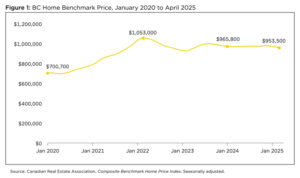
Rent Keeps Climbing
If you rent in BC, you’ve probably felt the squeeze. Even with a 3.5% cap on rent hikes for existing tenants in 2024, average rents jumped nearly 6%. One-bedroom units are averaging $1,627, while bigger three-bedroom places have surged over 15% to $2,474. Vacancy rates did improve slightly—from a rock-bottom 1.2% to 1.9%—thanks to more new builds.
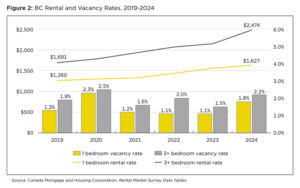
Slowing Immigration & More People Leaving BC
BC’s population still grew in 2024, mainly from international immigration, but the pace is slowing. The feds plan to bring in fewer permanent residents over the next few years, plus there’s a cap on study permits. Meanwhile, BC actually lost residents to other provinces in 2024 for the first time in over a decade—mostly to Alberta—driven largely by housing costs.
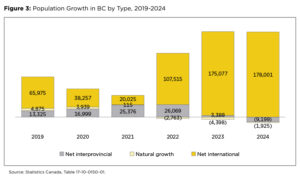
Housing Supply Still Can’t Keep Up
Even with a record number of new homes built in 2024, it wasn’t enough to match the population boom in BC’s major cities. Most of what’s being built is higher-density housing, like condos and townhomes, which helps but still doesn’t meet demand.
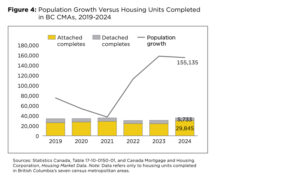
Debt Levels High, But Defaults Still Low
British Columbians carry some of the highest household debt in Canada—188% of disposable income. Mortgage delinquencies have ticked up slightly but remain low. One reason? Many younger folks are delaying buying a home altogether, keeping their debt lower.
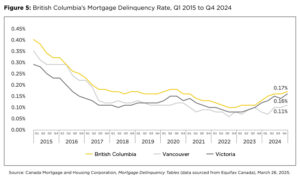
Bottom Line
BC’s housing market is stuck in a tug-of-war—more listings and lower interest rates are giving buyers some leverage, but uncertainty from trade disputes, high debt, and affordability challenges are keeping many on the sidelines. If we want to keep people here (and attract new ones), we need more homes, better wages, and policies that make it easier to own.
As always, if you’re considering buying or selling a home in Abbotsford, feel free to reach out. We are here to help navigate these new mortgage rules and ensure you make informed decisions that suit your financial goals: primepropertygroup.ca/contact
Source: bccpa.ca